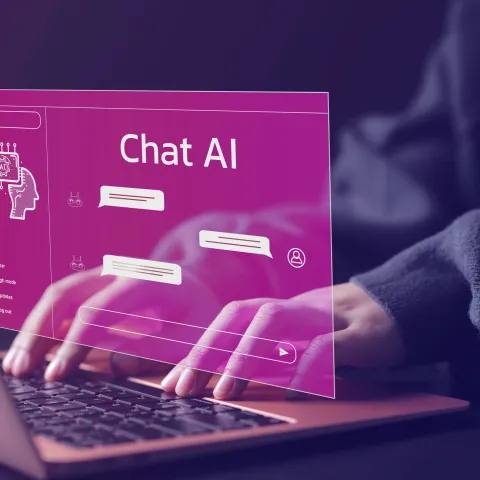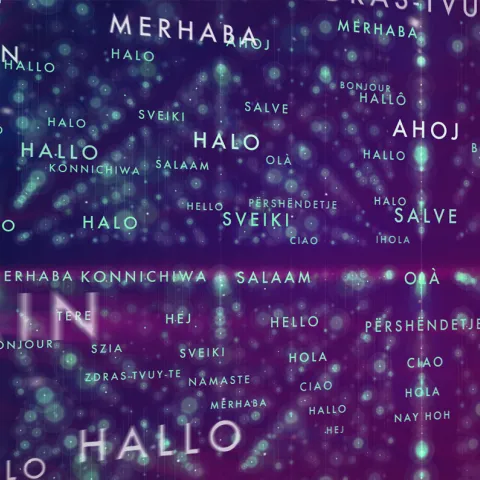
Translation and the future of work: finding a productive (and ethical) synergy between artificial intelligence and human intelligence
We are living in an era in which science fiction narratives seem to come to life and become reality, a time when Asimov's laws of robotics have never been more pertinent. We are at the heart of a not entirely silent revolution, with artificial intelligence as the protagonist. However, it is important to emphasise that the human being remains at the centre of everything, their intelligence amplified by the adoption of these emerging technologies. What does this synergy between man and machine generate? The professions of the future are no longer a distant hypothesis but a concrete reality that we are already experiencing. Let’s explore them together.
Artificial Intelligence is no longer a sensational topic, despite continuing to make headlines, as demonstrated by the search volume for the query "artificial intelligence" on Google - 35,000 per 100,000 people in Italy - or the number of times Chat GPT was mentioned in the Italian press - 30,000 times in 2023 alone. These figures were presented in the new Deloitte Report of April 2024, along with insights into AI ethics and the need for a collaborative relationship between the two forms of intelligence, artificial and human, to get the best out of both worlds.
The Reciprocal Influence of Artificial and Human Intelligence
At STAR7, we have been discussing this for some time: we are in the era of the Augmented Workforce, where work becomes the result of cooperation between humans and artificial intelligence, but where the human element remains essential and fundamental, guiding any process of technological evolution (or revolution).
What is the future of work in this rapidly evolving context? It is estimated that by 2030, 30% of the current working hours in Europe could be automated, a development accelerated by generative artificial intelligence. This scenario is rich in possibilities and potential challenges. To best tackle it, Europe will need to work on enhancing human capital and accelerating technological innovation, as detailed in the May 2024 McKinsey Global Institute Report:
“Businesses will need a major skills upgrade. Demand for technological and social and emotional skills could rise as demand for physical and manual and higher cognitive skills stabilises. Surveyed executives in Europe and the United States expressed a need not only for advanced IT and data analytics but also for critical thinking, creativity, and teaching and training – skills they report as currently being in short supply. Companies plan to focus on retraining workers, more than hiring or subcontracting, to meet skill needs.”
The Translator of the Future: A Role in Continuous Evolution and Specialisation
Not only advanced technical computer skills, specialisation, and data analysis but above all critical thinking, creativity, teaching, and training: these are the most sought-after and hardest-to-find skills. Simply having advanced technologies at one's disposal is not enough to achieve excellent results.
In "Machine Translation: A Future Already Present", we have already asked ourselves if the results of automatic translation are capable of meeting the highest quality standards. We then delved into the nature of Artificial Intelligence and its role within the business world in "Artificial Intelligence: The Revolution in Work Has Begun", touching on some of these increasingly sought-after figures in the job market, such as the prompt engineer (or designer).
This rapidly evolving world is having a particular impact on the profession of translator; some topics become obsolete overnight, hence the constant need for training and information, research, and development. It is no longer enough to study to stay up to date; it is about studying to work. Studying itself becomes an integral part of the translator's work, a necessary mindset that must underpin every action, along with the practice of learning by doing, given the ephemeral nature of the reality that we inhabit.
Hence the importance of certain soft skills, as mentioned, which become fundamental for navigating the jobs of the digital age: critical and creative thinking, flexibility, adaptability, curiosity, and proactivity.
The emergence of these new highly sought-after job roles - but roles that are still difficult to fill - constitutes an important array of opportunities for young people who need to enter the job market.
The World of AI is About to Begin: New Job Opportunities for Young People
It is evident that with the advancement of artificial intelligence capabilities, the role of localisation experts is transforming. These professionals are increasingly becoming managers and refiners of machine-produced translations, working in collaboration with technology. This dynamic interaction between user and tool generates reciprocal influence, an integration that might lead some to think that there’s a sense in which "cyborgs" are already here, and that actually means us.
But in this return to the future, what are these new tasks and functions, and what do they consist of? What makes these figures so sought-after and hard to find? Let's explore this new fascinating professional landscape together.
- Prompt Engineer or Prompt Designer - A figure specialised in designing the instructions to be given to the machine (prompts), increasingly sought-after across various fields: from finance to customer care, from art to the legal sector, from healthcare services to automated translations.
- AI and Machine Translation Specialist - Professionals who handle the implementation and optimisation of automatic translations and AI-based technologies in the localisation field.
- Multimodal Localisation Specialist - Experts with multidisciplinary skills, capable of adapting content for various media, such as text, audio, video, and graphics, to meet the diverse needs of a global audience.
- Accessibility and Inclusive Localisation Specialist - Specialists who make localised content accessible to people with various types of disabilities, incorporating features like subtitles and audio descriptions.
- Data Privacy and Compliance Specialist - Professionals who ensure that localised content complies with local data protection and privacy regulations, particularly important in regions with strict compliance requirements.
As we have seen, the evolution of artificial intelligence is radically redefining the job landscape,with new challenges and emerging opportunities - fertile ground that offers young people and those with advanced skills or a desire to engage a wide range of professional growth possibilities. In the next article, we will explore in detail the emerging professional figures in the field of translation. We will analyse the day-to-day responsibilities of each role, the cutting-edge tools and technologies used, the skills needed to excel, and the professional development prospects within the STAR7 ecosystem.


